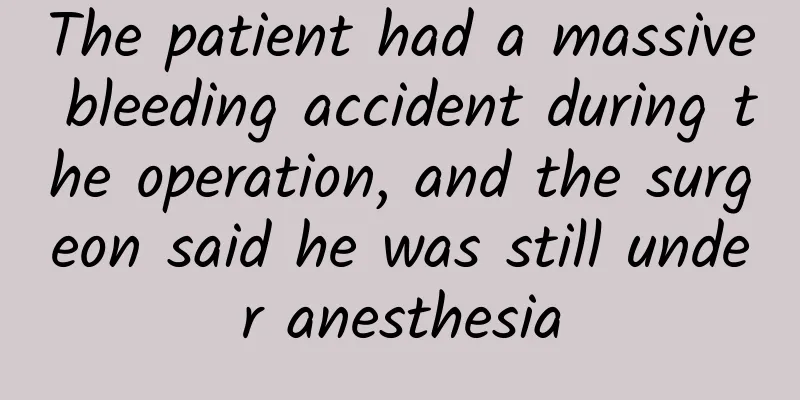The patient had a massive bleeding accident during the operation, and the surgeon said he was still under anesthesia

|
At 8 a.m., the general surgery operating room officially opened. The first operation was a subtotal gastrectomy for a gastric ulcer. Although the patient was a bit old, the operation was not major, so everyone went into it with a relaxed attitude. The operation was originally planned to be completed at around 10 o'clock, but the patient did not leave the operating room until 12 o'clock. Because the patient is old and has poor cardiopulmonary function, the anesthesiology department recommended that the surgeon perform the operation directly. Direct surgery can avoid the impact of laparoscopic use of carbon dioxide on the cardiovascular system. During the operation, after seeing the surgical stapler inserted, Dr. Li, who was in charge of anesthesia, estimated that the operation was about to end, so he adjusted the long-acting medicine appropriately. Soon, the surgeon stepped down, and the job of sewing the incision was handed over to the young assistant. However, the operation was delayed. When the curtain was opened, the surgical assistant was actually probing the abdominal cavity with his hands. The location he was probing was actually the spleen. Seeing his actions, Dr. Li was about to stop him, but when he turned around, he saw that the senior doctor had not left yet. With a nervous mood, I waited for the young doctor to start suturing the wound. During this period, in order to urge him to suture quickly, he deliberately asked the young doctor: Why are you exploring the spleen? They said confidently: The patient has esophageal varices and hepatitis, and we can see if his spleen is enlarged. The surgeon looked up at the operating table and said: "Hurry up and sew it up." Then the young doctor took his hand out of the abdominal cavity. However, when the young doctor took out his hand, he was shocked: there was obvious fresh blood on the glove. This meant that there was a new bleeding point! The surgeon, no longer calm, came to the operating table and asked: What's wrong? He guessed what was going on and asked his assistant to pull up the left abdominal wall. After looking at it, he turned around and went out to wash his hands. After returning to the stage, he searched, cleaned the blood in the abdominal cavity, and repaired the spleen. It turned out that when he was exploring the spleen, he used too much force and broke the spleen capsule. As soon as he saw the bleeding on the operating table, Dr. Li immediately expanded the volume and raised the blood pressure. In the meantime, he used blood gas analysis to monitor the changes in the internal environment. The two units of red blood cells that were reserved before the operation also came in handy at this time. After half an hour of work, the crisis was resolved. This time, the surgeon sutured the wound himself. After the stitches were completed, he walked out without looking back. He was obviously a little angry at the young doctor's recklessness. After experiencing blood loss and receiving additional anesthesia for the second time, the patient experienced delayed awakening. There was no other way, Dr. Li could only try his best. However, a phone call from a family member almost made Dr. Li explode with anger. In the past, everyone believed that surgeons were the most important, but people within the medical industry know how important anesthesiologists are to surgery. So the family members found Dr. Li in a roundabout way, hoping that Dr. Li would give the patient anesthesia. Because of this, Dr. Li, who was still in the operating room, had no idea what the surgeon had said to the family members. The family members asked anxiously: "Why did it take so long? The operation is over, why hasn't he woken up yet?" After a thousand words went through his mind, Dr. Li forced himself to say: The old man is old, don't worry. After hanging up the phone, looking at the somewhat panicked assistant, the assistant also knew that it was his own problem and immediately avoided Dr. Li's gaze. Nearly 20 minutes later, the old man regained consciousness. After meeting the extubation criteria, Dr. Li removed the old man's tracheal tube. When leaving the operating room, I asked for help to find Dr. Li's family members, but they were no longer polite. Their cold faces showed that they thought they had found the wrong person. How could he know how much effort Dr. Li put in behind the unexpected situation. However, is this easy to explain? Can it be explained? [Warm Tips] Follow us, there are a lot of professional medical knowledge here, revealing the secrets of surgical anesthesia for you~ |
Recommend
The liver is the largest organ in the human body. To protect your liver, do less of these four things, and liver cancer will avoid you.
The liver is the largest organ in the human body ...
Postpartum embolism
Many people think that the most dangerous time fo...
Four criteria for measuring whether a woman's menstruation is normal
The amount of blood a woman loses during menstrua...
How long does it take for ovulation to occur if the ovulation test paper turns red in seconds?
The ovulation test strip can effectively infer wh...
Unveiling the secrets of interventional treatment for vascular malformations: safe, accurate, and multiple?
Author: Shen Gang, Chief Physician, Children'...
One month after abortion, the menstrual flow is heavy
After a period of recovery after a miscarriage, w...
Can pregnant women have their teeth extracted?
Pregnancy is prone to tooth bleeding and swollen ...
What happens when leucorrhea becomes thick and paste-like?
Women’s physical health is a very important matte...
What should I do if I haven't had my period for two months?
Women's menstrual health issues are very trou...
Can women eat durian when they have their period?
After the menstrual period, everyone needs to adj...
Six months pregnant vaginal swelling
When you are six months pregnant, you reach the s...
What to do if you have pubic pain after childbirth
For mothers who experience pubic pain after child...
I popularize science, you listen | Do people who blush when drinking have better alcohol tolerance?
Your browser does not support the audio tag Quest...
How to have a spontaneous abortion when you are pregnant
If people do not want the fetus in their abdomen ...









